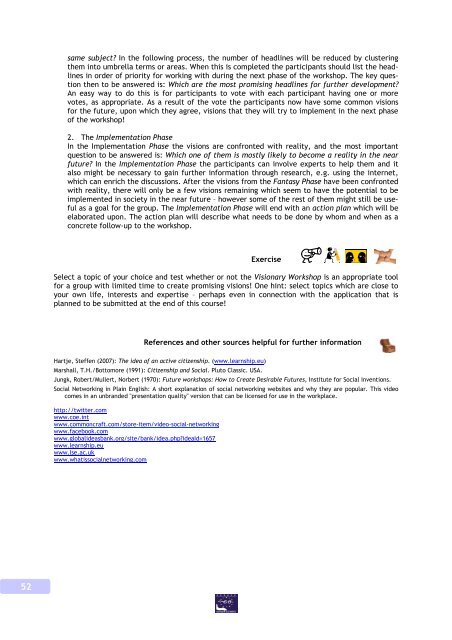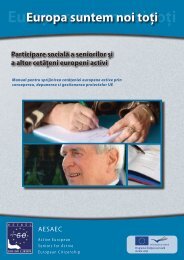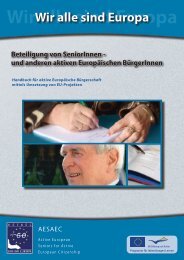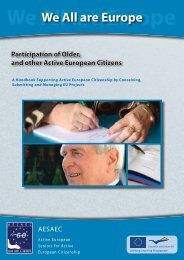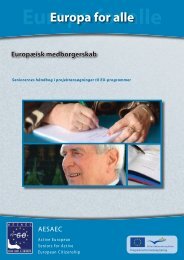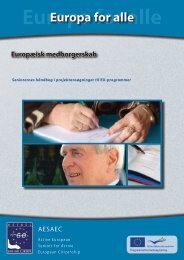We All are Europe - AESAEC
We All are Europe - AESAEC
We All are Europe - AESAEC
You also want an ePaper? Increase the reach of your titles
YUMPU automatically turns print PDFs into web optimized ePapers that Google loves.
same subject In the following process, the number of headlines will be reduced by clustering<br />
them into umbrella terms or <strong>are</strong>as. When this is completed the participants should list the headlines<br />
in order of priority for working with during the next phase of the workshop. The key question<br />
then to be answered is: Which <strong>are</strong> the most promising headlines for further development<br />
An easy way to do this is for participants to vote with each participant having one or more<br />
votes, as appropriate. As a result of the vote the participants now have some common visions<br />
for the future, upon which they agree, visions that they will try to implement in the next phase<br />
of the workshop!<br />
2. The Implementation Phase<br />
In the Implementation Phase the visions <strong>are</strong> confronted with reality, and the most important<br />
question to be answered is: Which one of them is mostly likely to become a reality in the near<br />
future In the Implementation Phase the participants can involve experts to help them and it<br />
also might be necessary to gain further information through research, e.g. using the internet,<br />
which can enrich the discussions. After the visions from the Fantasy Phase have been confronted<br />
with reality, there will only be a few visions remaining which seem to have the potential to be<br />
implemented in society in the near future – however some of the rest of them might still be useful<br />
as a goal for the group. The Implementation Phase will end with an action plan which will be<br />
elaborated upon. The action plan will describe what needs to be done by whom and when as a<br />
concrete follow-up to the workshop.<br />
Exercise<br />
Select a topic of your choice and test whether or not the Visionary Workshop is an appropriate tool<br />
for a group with limited time to create promising visions! One hint: select topics which <strong>are</strong> close to<br />
your own life, interests and expertise – perhaps even in connection with the application that is<br />
planned to be submitted at the end of this course!<br />
References and other sources helpful for further information<br />
Hartje, Steffen (2007): The idea of an active citizenship. (www.learnship.eu)<br />
Marshall, T.H./Bottomore (1991): Citizenship and Social. Pluto Classic. USA.<br />
Jungk, Robert/Mullert, Norbert (1970): Future workshops: How to Create Desirable Futures, Institute for Social Inventions.<br />
Social Networking in Plain English: A short explanation of social networking websites and why they <strong>are</strong> popular. This video<br />
comes in an unbranded "presentation quality" version that can be licensed for use in the workplace.<br />
http://twitter.com<br />
www.coe.int<br />
www.commoncraft.com/store-item/video-social-networking<br />
www.facebook.com<br />
www.globalideasbank.org/site/bank/idea.phpideaId=1657<br />
www.learnship.eu<br />
www.lse.ac.uk<br />
www.whatissocialnetworking.com<br />
52


